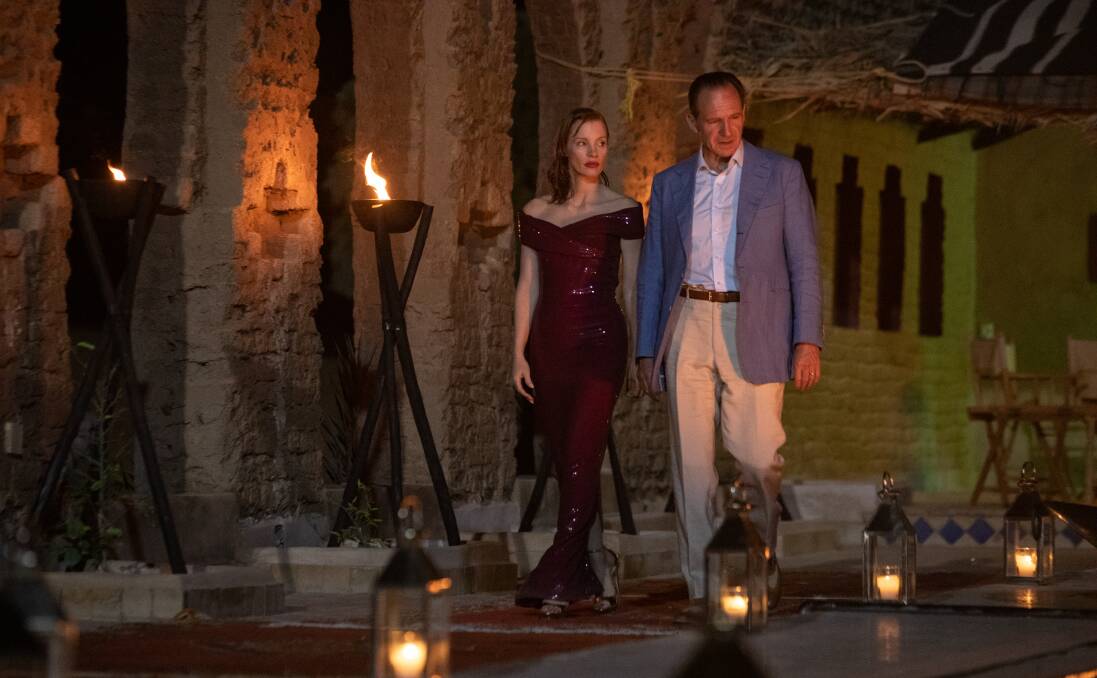The Forgiven. MA15+, 107 minutes. Two stars.
The Forgiven begins with all the credits at the beginning. That happened a lot with older movies, but they didn't include nearly as many people.
And when I say all, I mean all. Here we have the transportation coordinators, the unit publicist, and all the other people involved given their due early, to an audience unlikely to walk out. Nobody did at the Dendy screening I attended.
This early credit dump is a little disconcerting but it does allow director-producer John Michael McDonagh (who also adapted Lawrence Osborne's novel) to set a disquieting mood, and to end his film abruptly, which was presumably the intention.
McDonagh's previous films include The Guard (2011) and Calvary (2014), both of which starred Brendan Gleeson, playing as a cop and a priest, respectively, intriguing stories about character and morality.
It's not hard to see why this material here attracted him. Although Gleeson's not starring this time, some of the same thematic concerns are present. It's a tricky film to get a handle on, but there's enough here to make it worthwhile if you're up for a rather grim adult drama with some dark humour.
One of my friends says he can't get into a movie unless there's a character to "root for". I'm not that picky - as long as a film doesn't bore me, I'll give it a go - but the characters who populate this film - with very few exceptions - are a particularly unappealing bunch.
The Henningers are married, but things don't appear to be going well. David (Ralph Fiennes) is an alcoholic doctor who's had to pay a big negligence settlement and Jo (Jessica Chastain) is a children's author who hasn't published anything in years. They're constantly bickering and sniping and not necessarily in an affectionate way.
He's a supercilious bigot, constantly spouting slurs against Muslims, Morocco and whatever else takes his mind, which exasperates her - though not to the extent she condemns him with much vigour.
As they are driving to the holiday house of David's old friend Richard (Matt Smith) and his boyfriend for a weekend party in Morocco, a young man, Driss (Omar Ghazaoui) suddenly appears on the road.
David, who's drunk and speeding, drives straight into Driss, killing him.
They take the dead body to the house - some host gift! - and the police are called. They seem remarkably blase about the whole thing, accepting David's explanation that it was a terrible accident and departing.

The Henningers don't seem to be especially concerned by what has happened and neither do the other guests, a dissolute assortment of English, European and Americans who dispense bitchy witticisms (and half-witticisms) when they're not drinking, taking drugs, having sex or openly disparaging the Muslim employees who quietly wait on them.
It seems as though David and Jo might be free to party after all, joining in all the decadence and depravity.
But, of course, things are not that simple.
Driss' father Abdellah (Ismael Kanater) comes and demands that David accompany him as he claims his son's corpse to bury it. David is aghast - "What if they're ISIS?!" - but eventually is persuaded it would be best. It's also suggested that a bit of financial compensation might be appropriate, but he's not very keen on this, either.
While he is engaged on this unexpected mission - full of trepidation - his wife is enjoying the hedonism of the party weekend.
Fiennes always looks a bit like he's got an upset stomach: he's good at villains (Schindler's List) and authority figures (the new M in the James Bond movies) and can toss off a droll line (he gets plenty of opportunities here) but he doesn't always convey much emotion or elicit much sympathy.
At least he has a character who's undertaking a journey (literal and figurative); Chastain doesn't get all that much to do. Kanater is dignified and enigmatic as the father. Smith and the other partygoers are all capable actors but the character are thinly drawn and become tiresome.
The production values are good with lots of well photographed desert vistas conveying mystery, beauty and danger. And there are other worthwhile elements. The disparity between the wealthy white people and the poor Moroccans is effectively established - the latter forage for fossils to sell to the former - and some of the characters are drawn with sympathy and complexity.
But the film ultimately disappoints.


